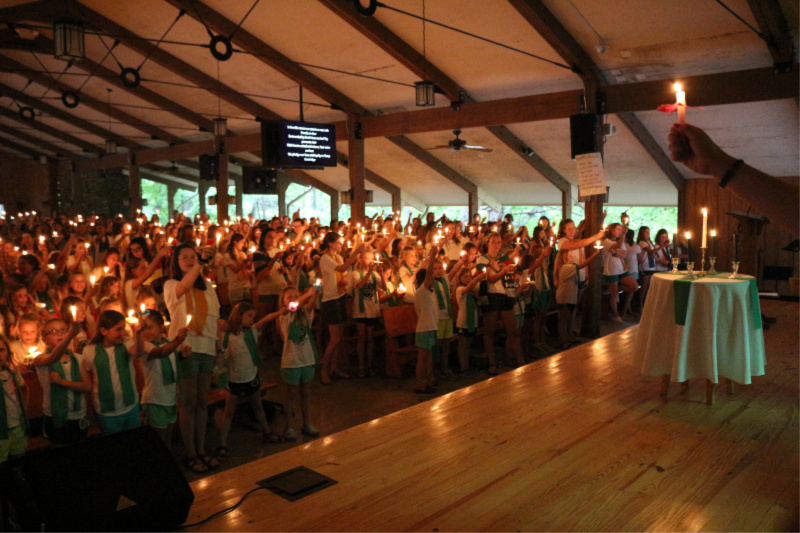The Dark Before the Dawn
Posted by Karah

PAUSE
Find a quiet place and silence your cell phone. Sit quietly, relax, and prepare your heart to see what God has to say in His Word.
Good and evil are constantly locked in a spiritual battle, but in today’s passage Satan directly challenged God by entering Judas. Although we can’t ignore the fact that Judas was still responsible for choosing to plot against Jesus, we have to acknowledge that Judas gave in to temptation, particularly in regards to His desire for wealth.
“While He was still speaking, suddenly a mob was there, and one of the Twelve named Judas was leading them. He came near Jesus to kiss Him, but Jesus said to him, “Judas, are you betraying the Son of Man with a kiss?”
—Luke 22:47-48
Read Luke 22:1-6,47-53 in your Bible and answer the following.
• What caused Judas to agree to betray Jesus to the priests and religious
leaders? Explain.
• The soldiers and religious leaders likely expected Jesus to fight back. Instead, He went with them peacefully and willingly. What does this tell you about His character and the importance of God’s plan? Jesus referred to Judas’ betrayal and Jesus’ arrest as “the dominion of darkness” (v. 53). The events that followed Jesus’ arrest probably caused the disciples to feel hopeless, but God was victorious—He raised Jesus from the dead.
RESPOND
• List a few areas you’re currently struggling with giving over to God. Then, ask Him to help you trust Him no matter what you face.
• How can you focus on the victory we already have in Jesus as you face difficult situations? Record some ideas in your journal.
• For further study on Judas’ betrayal and Jesus’ arrest, read Matthew 26:1-5, 47-49; Mark 14:1-2; and John 11:47-57.
BEHIND THE STORY
In Luke 4, Satan tempted Jesus for 40 days without success. Jesus fought temptation with God’s Word and God’s power. By Luke 22, Satan changed strategies and instead tempted Judas. Trent Butler says, “Satan could not lure Jesus with his tempting, but he did prevail over Judas. This was more than yielding to temptation. Satan actually entered Judas, controlling him as if he were possessed by demons.”(1)
THE POINT
It may seem like evil overcomes for a time, but God has already won the ultimate victory through the death and resurrection of His Son, Jesus.
(1)Trent C. Butler, Holman New Testament Commentary — Luke, ed. Max Anders, (Nashville, TN: Broadman & Holman, 2000), Under “Luke 22 — Opposing the Glory.” Accessed via mywsb.com
Posted in Devotions, Girls | Tagged Camp Crestridge for Girls, Reprinted from ec magazine. @ 2016 LifeWay Christian Resources of the Southern Baptist Convention, Ridgecrest Summer Camps, Weekly Devotions | Leave a reply
True Devotion
Posted by Karah

PAUSE
Reflect on all that God has forgiven you for and thank Him for giving you the opportunity to be in relationship with Him.
“Therefore I tell you, her many sins have been forgiven; that’s why she loved much. But the one who is forgiven little, loves little.” Then He said to her, “Your sins are forgiven.” —Luke 7:47-48
Read Luke 7:36-50 in your Bible. Consider the following:
• Look at verses 37-38 and 43-46. Compare and contrast the woman’s actions to those of the Pharisee.
• The Pharisees considered this woman an outcast—she was labeled as a sinner. But she approached Jesus and anointed His feet with an expensive perfume. How does her gift demonstrate her thankfulness for Jesus’ forgiveness? Her faith?
• Though the woman’s gift may seem extraordinary, the greatest gift in this story is Jesus’ forgiveness of the woman’s sins. Even before His death on the cross, Jesus had the authority to forgive. What is significant about the phrases “your sins are forgiven” (v. 48) and “your faith has saved you” (v. 50)? Explain.
RESPOND
True gratitude leads to action. Jesus died to forgive the sins of all people for all time. Those who choose to receive His forgiveness and trust in Him as Savior will spend eternity with Him.
• In what ways have you responded to Jesus’ sacrifice for your sins? Journal a prayer thanking Jesus for His forgiveness.
• How will you show gratitude to Jesus this week? In the way you prioritize your time and resources? Serve God and others? Worship? List a few ideas on an index card and tape it to your bathroom mirror. Glance at the card throughout the week to remind you to show gratitude to Jesus in all you do.
• For further study on forgiveness, read Isaiah 43:25; Micah 7:18-19; Colossians 1:13-14; and 1 John 1:9.
BEHIND THE STORY
Both the alabaster jar and the fragrant perfume were expensive items in Jesus’ time. Luke didn’t say why the woman cried, but he did tell that her tears mixed with the perfume as she anointed Jesus’ feet. Bible scholars suggest that it’s possible the woman’s actions—wiping His feet with her hair and kissing His feet—demonstrated strong emotions such as gratitude and reverence.
THE POINT
Jesus died to forgive our sins. We should love Him above all else, serve Him, and worship Him.
Posted in Devotions, Girls | Tagged Camp Crestridge for Girls, Reprinted from ec magazine. @ 2016 LifeWay Christian Resources of the Southern Baptist Convention, Ridgecrest Summer Camps, Weekly Devotions | Leave a reply
Worship the King
Posted by Karah

PAUSE
Think of a few words that describe how God is worthy of our worship (ex: holy, eternal, magnificent) and praise Him using those words.
“Now He came near the path down the Mount of Olives, and the whole crowd of the disciples began to praise God joyfully with a loud voice for all the miracles they had seen: The King who comes in the name of the Lord is the blessed One. Peace in heaven and glory in the highest heaven!” —Luke 19:37-38
Read Luke 19:28-44 in your Bible and complete the following.
• In your journal, sketch a picture of the scene described in verses 37-38. Jesus humbly entered Jerusalem on a donkey, but was greeted by a royal procession worthy of a king. His triumphal entry moved His people to praise.
• These people recognized that Jesus came in God’s name. Why is that significant?
• The Pharisees asked Jesus to rebuke His disciples for calling Him “the blessed One” and “King.” Examine Jesus’ response and write it in your own words.
• Read through the passage again and note how the crowd worshiped Jesus. Note in your journal the attitudes and actions of the crowd.
RESPOND
• Look at what you noted about attitudes and actions in the above question. Examine your heart. Do these words describe the way you worship God?
• List attitudes and actions in your own life that need to change to enhance the way you worship God.
• For further study on worshiping God, read Psalm 118:26; Psalm 150; and Romans 12:1-2.
BEHIND THE STORY
Jesus was not the king that most Jews expected. Some expected a political leader who would free them from Roman rule through diplomacy; others looked for a military leader who would overthrow the Roman government. They didn’t expect a king who would free people from their sins.
THE POINT
Jesus is our King— worthy of honor and glory. We should worship Him.
Posted in Devotions, Girls | Tagged Camp Crestridge for Girls, Reprinted from ec magazine. @ 2016 LifeWay Christian Resources of the Southern Baptist Convention, Ridgecrest Summer Camps, Weekly Devotions | Leave a reply
Purified
Posted by Karah

PAUSE
Take a moment to clear away any distractions so you can fully focus on God as you study His word today.
“Then He began to teach them: ‘Is it not written, My house will be called a house of prayer for all nations? But you have made it a den of thieves!’” —Mark 11:17
Read Mark 11:15-19 in your Bible. Ask yourself:
• How was Jesus portrayed in this story? How does this relate to the character of God in regards to purity?
• Why did Jesus overturn tables and throw out the people who were buying and selling in the temple complex? Explain.
• Compare and contrast “house of prayer” and “den of thieves” in your journal (v. 17).
Jesus cleared out the money changers and those selling animals for sacrifice. They defiled the temple, which was designed as a place of prayer and worship. These business people set up their tables in the court of the Gentiles—a space intended to allow non-Jews to worship. The people lost sight of the temple’s purpose.
• Can you think of an example of this today? When have you lost sight of your main purpose as you follow Jesus?
RESPOND
The Bible says that our bodies are sanctuaries of the Holy Spirit (1 Cor. 6:19).
Impurity comes in many different forms and affects different people in different ways.
• Do you struggle to keep your mind pure? Your body? Your heart? Journal your response, confessing your need for Jesus to help you stand strong in the face of temptation.
• List three ways you can guard your heart against impurity.
• For further study on keeping God’s temple pure, read Isaiah 56:7; Jeremiah 7:11; Matthew 21:12-13; and Luke 19:45-46.
BEHIND THE STORY
In Jesus’ day, Jews had to pay a temple tax and often needed to buy sacrifices for the altar. The type of money used varied in each city and region. The money changers set up shop to help people convert their currency in order to pay the temple tax. Some money changers made extra profit by loaning their own money along with investor money and charging interest rates of up to 300 percent each year.(1)
THE POINT
Jesus’ cleansing of the temple pointed the people back to the true purpose of the temple—worshiping and glorifying God.
(1)Holman Illustrated Bible Dictionary, eds. Chad Brand, Charles Draper, and Archie England, (Nashville, TN: Holman Bible Publishers, 2003),Under “Money Changers.” Accessed via mywsb.com.
Posted in Devotions, Girls | Tagged Camp Crestridge for Girls, Reprinted from ec magazine. @ 2016 LifeWay Christian Resources of the Southern Baptist Convention, Ridgecrest Summer Camps, Weekly Devotions | Leave a reply
In Remembrance of Me
Posted by Karah

PAUSE
Listen to Matt Maher’s song “Remembrance (Communion Song)” (Alive Again, 2009) to prepare your heart for today’s devotion.
“For this is My blood that establishes the covenant; it is shed for many for the forgiveness of sins.” —Matthew 26:28
Read Matthew 26:17-30 in your Bible and consider the following.
While observing the Passover with His disciples, Jesus explained the significance of the Passover meal, which we know as the Lord’s Supper, often called Communion.
• What was the significance of the first Lord’s Supper?
• What does this symbolic event help Christians to remember?
Verse 28 says that Jesus’ blood was shed for our forgiveness. Our redemption rests in Christ and was made possible through His blood. (See Eph. 1:7).
• Explain in your own words the new covenant that would be established through Jesus’ blood.
• How does the Lord’s Supper help you acknowledge God’s love for you?
• Read Romans 6:22-23. We are all slaves to sin before we trust Jesus as Savior. Describe how the Lord’s Supper demonstrates freedom from slavery to sin.
RESPOND
• Think back to the first time you took part in the Lord’s Supper. Journal about that experience.
• Develop a plan for how you will observe the Lord’s Supper differently next time. How will you prepare your heart? Include prayer points and Scriptures to meditate on.
• For further study on blood and atonement, read Leviticus 16; 17:11; Ephesians 1:7-8; and 1 Peter 2:24.
BEHIND THE STORY
There is no atonement for sins apart from blood. In the Old Testament, animal sacrifices were required to atone for the sins of the people. The Holman Illustrated Bible Dictionary points out that “Jesus, the God-man, gave up His life and experienced the reality of death so that those who identify themselves with Jesus might experience His life and never taste death as He did. He died as a sin-bearer that we might live for righteousness and become healed (1 Pet. 2:24).” (1)
THE POINT
Participating in the Lord’s Supper helps us to remember that Jesus’ sacrifice freed us from the bonds of sin.
(1) Holman Illustrated Bible Dictionary, eds. Chad Brand, Charles Draper, and Archie England, (Nashville, TN: Holman Bible Publishers, 2003),Under “Blood.” Accessed via mywsb.com.
Posted in Devotions, Girls | Tagged Camp Crestridge for Girls, Reprinted from ec magazine. @ 2016 LifeWay Christian Resources of the Southern Baptist Convention, Ridgecrest Summer Camps, Weekly Devotions | Leave a reply
Motive & Heart
Posted by Karah PAUSE
PAUSE
Before you open your Bible, ask God to help you examine your motives and the intentions of your heart as you spend time with Him today. Consider the many ways Jesus has proven Himself to be the authoritative, powerful, Son of God. List some ways in your journal, then circle those that are most meaningful to you.
“Right away Jesus understood in His spirit that they were thinking like this within themselves and said to them, ‘Why are you thinking these things in your hearts?’” —Mark 2:8
Read Mark 2:1-12 in your Bible. Think through these questions:
• In verse 8, Jesus’ question revealed that He knew what the Pharisees were thinking in their hearts. Why is this important?
God is omniscient. When Jesus revealed the Pharisees’ inner state, He showed His power, authority, and oneness with God.
• In what other ways did Jesus show His power and authority in verses 9-10?
• Look at verse 12. How did the people react to Jesus revealing His authority through healing the man and forgiving His sin? Why did they react this way? Explain.
RESPOND
God wants a relationship with us, but it is important to remember who He is—He’s not just the Giver of unconditional love—He has power over all things.
• Jesus determined the Pharisees’ thoughts and knew their hearts before they said a word. He knows you the same way. Ask the Holy Spirit to guide you as you examine your heart. Are there things you need to confess to God? Be honest with Him and ask Him to help you keep your heart pure.
• For further study, read Mark 9:14-27. Journal about how you identify with this father—you want to believe, but still struggle and sometimes doubt Jesus’ power to overcome all things.
BEHIND THE STORY
In Mark 2, Jesus forgave the paralytic’s sins. While we often think of sin as the wrongful actions a person has done, these actions are the symptoms of a greater problem—the break in our relationship with God. Whatever individual sins this man had committed, Jesus went beyond righting the man’s wrongs and actually renewed and reconciled the man’s broken relationship with God.
THE POINT
Jesus displays His power in His omniscience, forgiveness, and healing.
OMNISCIENT (adj.) = Knowing all things.
Posted in Devotions, Girls | Tagged Camp Crestridge for Girls, Reprinted from ec magazine. @ 2016 LifeWay Christian Resources of the Southern Baptist Convention, Ridgecrest Summer Camps, Weekly Devotions | Leave a reply
Tell All
Posted by Karah PAUSE
PAUSE
Take a few minutes to clear your mind and prepare for what God has to show you in His Word. Write down any pressing concerns and put them aside.
Before you begin, review last week’s devotion. Today, we will focus on what occurred after the man’s healing.
“The man from whom the demons had departed kept begging Jesus to be with Him. But He sent him away and said, ‘Go back to your home, and tell all that God has done for you.’ And off he went, proclaiming throughout the town all that Jesus had done for him.” —Luke 8:38-39
Read Luke 8:38-39 and complete the following.
• Examine this Scripture carefully. In your journal, jot down Jesus’ actions and the reactions of the man.
Jesus The Healed Man
• In other healing accounts, Jesus asked the people He healed not to tell about their experience, yet He commanded this man to do the opposite. Why is this significant?
The man begged to go with Jesus; He was desperate to stay with the One who freed Him. However, Jesus wanted the man to go and tell others what He did for him, and the man obeyed.
• Why did the man’ transformation require action? Explain.
• Highlight the word “proclaiming.” Look at the definition of proclaim below. How important was Jesus’ authority over evil in this man’s life? How important is Jesus’ authority over evil today?
RESPOND
• What Jesus did for you is worth sharing with others. In your journal, jot down the names of a few people you can tell about Him.
• Have you practiced telling people what God has done for you? Record your story and commit to telling one person from your list about it this week.
• For further study on redemptive stories, read about Paul’s conversion in Acts 9.
BEHIND THE STORY
Jesus was in the region of the Gerasenes when He healed the demon possessed man from the tombs. When the townspeople heard what Jesus had done, they were “gripped by great fear” (v. 37) and asked Him to leave. When Jesus asked the man to go back to his home and tell everyone what happened, He sent the man directly into the area Jesus was expelled from and where the man himself had been an outcast.
PROCLAIM (v.) = to publicly announce something of importance
Posted in Devotions, Girls | Tagged Camp Crestridge for Girls, Reprinted from ec magazine. @ 2016 LifeWay Christian Resources of the Southern Baptist Convention, Ridgecrest Summer Camps, Weekly Devotions | Leave a reply
Freedom from Oppression
Posted by Karah PAUSE
PAUSE
Take a deep breath and spend a few minutes contemplating the fact that nothing in the universe can separate you from the love of God.
“When He got out on land, a demon-possessed man from the town met Him. For a long time he had worn no clothes and did not stay in a house but in the tombs … then people went out to see what had happened. They came to Jesus and found the man the demons had departed from, sitting at Jesus’ feet, dressed and in his right mind. And they were afraid. Meanwhile, the eyewitnesses reported to them how the demon-possessed man was delivered.” —Luke 8:27,35-36
Read Luke 8:26-37 in your Bible. Think through the following questions:
• Circle instances of the words “beg,” “permit,” and “permission.” Why do you think the demons made requests of Jesus?
• What does the description of the demons’ power over the man—and the demons’ terrible fear of Jesus—tell you about Jesus’ authority?
When the people saw the healed man calmly seated at Jesus’ feet, they were afraid (v. 35). Before, He had worn chains and shackles, living among the tombs. Jesus’ power delivered the man from the demons and into new life. He has the power to free us from darkness and give us new life as well. (See Eph. 5:8; 2 Tim. 1:10.)
• What does it mean to have new life?
RESPOND
The demon-possessed man did not do anything deserving Jesus’ presence or His mercy; Jesus came to him to set him free. In the same way, He meets us where we are—we don’t have to be “cleaned up” before we can come to Him.
• How does your own spiritual transformation compare to that of the man in this story? What has Jesus freed you from? Journal your thoughts.
• How has Jesus changed your life? Think of ways you can tell your story to others. If you haven’t trusted Jesus as Savior, talk to one of your camp counselors or a pastor from your church.
• For further study, read What’s So Amazing About Grace? by Philip Yancey (Zondervan, 2002).
BEHIND THE STORY
The demons in the story call themselves “Legion.” The word legion comes from Roman military language, concerning armed forces comprised of varying units of soldiers and weaponry. On average, a Roman legion contained around 6,000 men. The legion was also the system by which Rome established its dominance before and during the time of Christ. The use of the name Legion
in this story not only spoke to the number of demons that possessed the man, but also their rule over him.
THE POINT
Like the demon-possessed man, we were set free from an entirely hopeless state to one filled with hope, and we should share this hope with others.
Posted in Devotions, Girls | Tagged Camp Crestridge for Girls, Reprinted from ec magazine. @ 2016 LifeWay Christian Resources of the Southern Baptist Convention, Ridgecrest Summer Camps, Weekly Devotions | Leave a reply
(REST)ORATION
Posted by Karah PAUSE
PAUSE
Remember a time when God came through for you. Reflect on it and thank Him for His continued faithfulness.
“’Satan has bound this woman, a daughter of Abraham, for 18 years—shouldn’t she be untied from this bondage on the Sabbath day?’ When He had said these things, all His adversaries were humiliated, but the whole crowd was rejoicing over all the glorious things He was doing.” —Luke 13:16-17
Read Luke 13:10-17 in your Bible. Ask yourself:
Jesus’ healing involved not only the physical healing of the woman’s disability, but also spiritual healing by casting out the evil spirit. Not all physical ailments were caused by demons. Bible scholars suggest this was a rare case in which both occurred simultaneously.
• Why did the leader of the synagogue complain about Jesus healing on the Sabbath? Why is that significant?
Jesus considered changing this woman’s life as more important than the religious leaders’ imposing rules. He respected the Sabbath, but didn’t refrain from doing God’s work on that day either. Despite the Pharisees’ anger at Jesus for healing a woman on the Sabbath, God was glorified through His actions.
• Look at verse 17. Jesus’ _________________ were humiliated, but the _________ rejoiced. Why?
RESPOND
When Jesus healed this woman, people rejoiced. The religious leaders used the law to bind people, but Jesus came to change people’s hearts by setting them free from sin. He did not nullify the law, but fulfilled it. God’s law still guides our behavior even though Jesus provides our righteousness.
• Examine your heart. What are some of your thoughts and actions that need to change? Ask Jesus to continue to change your heart and help you see your need for Him.
• For further study on God’s law, read Exodus 20:1-17. How does God’s law guide your behavior as a believer? Explain.
BEHIND THE STORY
The Sabbath is a holy day of rest in Jewish law. Its founding comes from Genesis 2:2-3, which stated that God rested on the seventh day after He created the heavens and the earth. God’s rest didn’t indicate exhaustion. Rather, He suspended His work in order to delight in it, modeling this practice for His people and establishing it in His law for them (Ex. 20:3).¹ By the time Jesus was born, the religious leaders had instituted many additional man-made rules about what could and could not be done that day.
THE POINT
God’s law helps us to see our need for a Savior, but Jesus changes our hearts and makes obedience possible. God’s law then guides our behavior.
¹Glen S. Martin, Holman Old Testament Commentary — Exodus, Leviticus, Numbers, ed. Max Anders, (Nashville, TN: Broadman & Holman, 2002). WORDsearch CROSS e-book, p. 88, Under: “Exodus 19-20 — God’s Top Ten List.”
Posted in Devotions, Girls | Tagged Camp Crestridge for Girls, Reprinted from ec magazine. @ 2016 LifeWay Christian Resources of the Southern Baptist Convention, Ridgecrest Summer Camps, Weekly Devotions | Leave a reply
All Things Are Possible
Posted by Karah PAUSE
PAUSE
Grab a pen, your Bible, and your journal. Find a quiet place and think of three things that you’re grateful for and thank God for those things.
Consider the word unbelief. What does this mean? When have you experienced unbelief and what did God do to help you believe? Journal about your experience.
“‘And many times it has thrown him into fire or water to destroy him. But if You can do anything, have compassion on us and help us.’ Then Jesus said to him, ‘If You can? Everything is possible to the one who believes.’ Immediately the father of the boy cried out, ‘I do believe! Help my unbelief.’” —Mark 9:22-24
Read Mark 9:14-29 in your Bible. Answer these questions:
• What did Jesus request of the boy’s father before He drove out the demon? Why is this important? Explain in your own words.
The father had the faith to come to Jesus and request help for his son, but he needed both faith and belief in Jesus for true spiritual healing to take place. Although, the disciples were unable to cast out this demon, Jesus had given them the power to do so, and they had experienced success before this encounter.
• List the two reasons Jesus gave for the disciples’ inability to drive out the demon.
RESPOND
• Have you ever fasted? What was it like? How did the experience draw you closer to God? Journal about your experience.
• Think of two people who have strong faith. List the two names in your journal and record characteristics that demonstrate each person’s faith.
• For further study on faith and prayer, read Mark 11:24; John 15:7; Romans 10:9; and Ephesians 2:8.
BEHIND THE STORY
The ESV Study Bible noted that “failure is an occasion for encouragement to more prayer … implying that more time and effort in prayer (and therefore in closer fellowship with God) leads to growth in faith.”¹ The disciples had been casting out demons already, but this particular spirit was beyond them. Spiritual growth continues throughout life, no matter your level of maturity in
the faith. Faith should be nurtured with prayer, because God desires to continue to reveal more of Himself to you.
THE POINT
Prayer and faith are essential to God’s will, and through them He can show us His power.
¹The English Standard Version Study Bible (Wheaton, IL: Crossway, 2008), p. 1912.
Posted in Devotions, Girls | Tagged Camp Crestridge for Girls, Reprinted from ec magazine. @ 2016 LifeWay Christian Resources of the Southern Baptist Convention, Ridgecrest Summer Camps, Weekly Devotions | Leave a reply